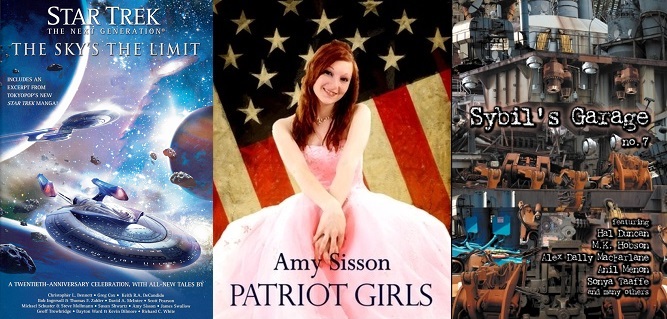I have to admit, it's a little discouraging to realize that for all the short fiction I've been reading, I still felt woefully unprepared to nominate for the Nebulas. But I did the best I could, and I continue to read a lot of 2015 fiction with the goal of being better prepared for the Hugo and World Fantasy nomination processes. Trouble is, now I also want to read the Nebula finalists in the novel category, and those votes are due March 31.
I guess it's better to have too much good fiction to read than not enough!
In any case, here are my four favorite short stories that I read in February.
"43 Responses to 'In Memory of Dr. Alexandra Nako'" by Barbara A. Barnett
Length: 1,372 words
Category: Short story (science fiction/fantasy)
Where Published: Daily Science Fiction
When Published: 2016-02-05
Link (free)
Lest you think this is another list story, which are quite the rage in spec fic these days, this isn't so much a list as simply the comments section of (almost) every blog post you've ever seen. There's the troll, the self-appointed grammar police, and the polite-but-increasingly-annoyed O.P. trying to keep the conversation civilized. And from all this, the author coaxes a real story, with characterization and an interesting plot. This is extremely well done and lots of fun.
"26 Monkeys, Also the Abyss" by Kij Johnson
Length: 4,000 words
Category: Short story (science fiction)
Where Published: Asimov's
When Published: July 2008
Reprinted: The Secret History of Fantasy (anthology, Tachyon Publications, 2010)
Link (free)
I'm embarrassed that I'm so late to the party on this 2008 story, but so glad I finally read it. Like the Barnett story listed above, the title and structure of "26 Monkeys, Also the Abyss" may call to mind a list story, but that isn't what this is. Instead, it's a wistful story about a young woman who runs a traveling show in which a group of performing monkeys literally disappears for the finale every night. It's one of those stories that seems like it may have originated in a dream. But instead of having the annoying arbitrariness that usually make dreams interesting only to the person who has them, this story kept the dreamlike quality while brewing something rich and meaningful. This story is not to be missed!
"The Opening of the Bayou Saint John" by Shawn Scarber
[Image: "Bayou" © 2016 Rhiannon Rasmussen-Silverstein. Used with permission.]
Length: 3,885 words
Category: Short story (fantasy)
Where Published: Strange Horizons
When Published: 2016-02-08
Link (free)
This is a lovely atmospheric piece about a bayou woman who transports stillborn children to another place, when requested to do so by grieving mothers willing to defy convention. There's just the right mix of magic and sense of place in this haunting story. Highly recommended.
"Trickier with Each Translation" by Bonnie Jo Stufflebeam
Length: 5,600 words (approx.)
Category: Short story (science fiction)
Where Published: Queers Destroy Science Fiction/Lightspeed
When Published: 2015-06
Link: N/A
This story is about time travel and superheroes and what it might be like to have loved both men and women. It's full of lovely, evocative details. I'll admit, I'm a sucker for time travel stories, and it amazes me how a well-written one can still bring something new to the table.
Other stories read in February 2016:
(alphabetical by author)
- "They Tell Me There Will Be No Pain" by Rachael Acks (original 2014; reprint 2015)
- "The Missing Finger of Jerry Garcia" by Jon Allison (year unknown)
- "Android One" by Richard Ankers (2016)
- "Fruit and Words" by Aimee Bender (original 2001; reprint 2010)
- "A Room for Lost Things" by Chloe N. Clark (2015)
- "Chatter Monkey" by Caroline Couderc (2016)
- "The Magician’s Assistant" by Paul Crenshaw (2016)
- "The Weight of a Blessing" by Aliette de Bodard (original 2013; reprint 2015)
- "Ants on a Trestle" by Elliotte Rusty Harold (2015)
- "Boy Seeds" by Nina Kiriki Hoffman (2011)
- "Mythago Wood" [novelette] by Robert Holdstock (original 1981; reprint 2010)
- "The Shapes Of Us, Translucent To Your Eye" by Rose Lemberg (2015)
- "In the Loop" by Ken Liu (original 2014; reprint 2015)
- "Dying with Her Cheer Pants On" by Seanan McGuire (original 2010; reprint 2015)
- "Calved" by Sam J. Miller (2015)
- "Mold" by Richard Mirabella (2016)
- "Town of Cats" by Haruki Murakami
- "May Dreams Shelter Us" by Kate O’Connor (2016)
- "Tomorrow's World" by Aimee Ogden (2016)
- "A Cure Over Coffee" by Pontius Paiva (2016)
- "Boy Twelve" by Jessica Reisman (original 2005; reprint 2015)
- "Seven Wonders of a Once and Future World" by Caroline M. Yoachim (2015)
- "The Urashima Effect" by E. Lily Yu (original 2013; reprint 2015)
- "Music" by Anna Zumbro (year unknown)
List of the sources from which these stories came:
(alphabetical by anthology title, magazine title, website name, etc.)
- Asimov's, Sept 2015
- Clarkesworld Year Seven (anthology), edited by Neil Clarke & Sean Wallace, Wyrm, 2015
- Crossed Genres, Sept 2015
- Daily Science Fiction, Feb 2011; Feb 2016; Mar 2016
- Diabolical Plots, Sept 2015; Feb 2016
- Flash Fiction Online, Feb 2016
- Freeze Frame Fiction, date unknown
- Lightspeed, Sept 2015
- New Yorker, Sept 2011
- One Teen Story, Jan 2016
- Queers Destroy Science Fiction!/Lightspeed, June 2015
- The Secret History of Fantasy (anthology), edited by Peter S. Beagle, Tachyon, 2010
- Strange Horizons, Feb 2016
- Unlikely Story: The Journal of Unlikely Academia, Oct 2015
- Warrior Women (anthology), edited by Paula Guran, Prime Books, 2015
Read more!





















